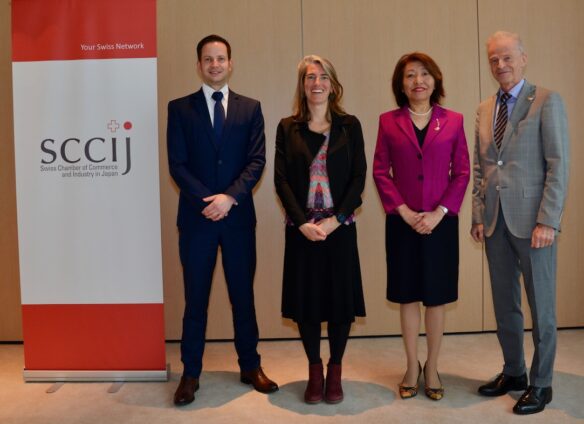Tokyo (SCCIJ) – Japan’s severe labor shortage in combination with the reluctance of many Japanese to work for non-Japanese companies is posing big challenges for foreign-affiliated companies in Japan, especially from Europe and the German-speaking countries Austria, Germany and Switzerland because they cannot compete in salary levels with U.S. companies. Also, there are differences between the demands of potential managers and regular staff which need to be taken into account, as Markus Gfeller, owner of the executive search agency and recruiting company G&S Japan, explained in an interview with the SCCIJ.
Mr. Gfeller, what are the reasons why the labor market is becoming tighter almost every day?
Markus Gfeller: First, the baby boomer generations are now retiring in high numbers. Second, there are not enough young people, women and foreigners entering the labor force to make up for these losses. Third, according to government statistics, Japan is experiencing its longest economic expansion phase since the war.
Let us talk about the top management level first. How choosy have candidates for such positions become?

Markus Gfeller of G&S Japan
Markus Gfeller: The demands of the candidates are quite high. From their point of view, their new employer company has to be very solid and healthy, it has to think long-term and the communication style has to be pleasant. The candidates also want to know how successful the products are and whether products and business are sufficiently localized in Japan. The candidates simply want to be sure that they can be successful if they take the job. If the product is too expensive for them or the market is too small, they decline the job.
And what is the view of companies from German-speaking countries looking for a managing director in Japan? What are their selection criteria?
Markus Gfeller: These companies want above all people who can communicate well. At the annual meetings of the managing directors from many countries, especially if the Japanese subsidiary stands for 5% or 10% of sales, this subsidiary should be well represented and “marketed” internally and externally.
This means that good English is an absolute must for the prospective managing director. Companies want someone with whom they can communicate easily. Personal chemistry also plays an important role, especially for family businesses. They often send their candidates to Germany before they are hired. Personality accounts for 50 percent of the hiring decision.
Has the salary level for such positions changed in the past couple of years?
Markus Gfeller: This aspect is quite dependent on the exchange rate. A salary of 18 million yen for a managing director used to equal 180,000 euros, but now it’s about 140,000 euros which is much more bearable for small and medium sized companies. Besides this, the level has not changed.
Medium-sized companies pay less than large corporations, the financial industry and U.S. companies. Those pay higher bonuses and can lure managers with stock options. The decision of candidates depends on what they want. Companies from Switzerland, Germany and Austria are better suited to the Japanese mentality because both prefer long-term and solid organic growth to fast money. Of course, not every Japanese potential managing director thinks like this.
How does the situation of managing directors differ from the placement of lower positions such as accounting, service or sales?
Markus Gfeller: We also cover this area with our brand “Gaipro”. These positions involve salary ranges of 4 million to 8 million yen, for example for sales employees, quality supervisors or service technicians. These people can’t afford a long search for a new job. They are looking for something long-term and pay particular attention to job security.
The salary itself is not the most decisive factor for the decision. Younger people between the ages of 25 and 35 also want exciting and interesting tasks and dream of some fun at work. Career is not so important to them either, as there are few opportunities for advancement in small companies. For them, the work-life balance must be right. They ask us in job interviews how people deal with each other in the office and whether the managing director is a foreigner. These people also know that they are taking a risk, especially if the company is smaller.
Why is it that foreign-affiliated companies cannot easily succeed in the competition for talented people in Japan?
Markus Gfeller: Japanese people choose Japanese companies rather than foreign companies mainly because there is a “sense of security”. There is no worry of a withdrawal like with a foreign-affiliated company, and there is no necessity for cross-cultural integration. The main challenge for foreign companies in Japan is to overcome this reluctance of many Japanese job seekers. For this, they have different options: higher pay, permanent instead of temporary contracts, also a good work-life balance.
G&S Japan mainly works for small- and medium-sized companies, often family businesses. How does their attitude towards job placement differ from big companies?
Markus Gfeller: Big companies can afford the luxury of setting their own global standards and not taking local specifics into account when recruiting. That doesn’t work very well in Japan. The bottom line is that a selection according to strict and inflexible criteria easily leads to a high fluctuation rate. This has particularly negative effects here in Japan. SMEs understand and accept the peculiarities of Japan better. Hence, they are better able to hire employees who stand behind their company with all their heart.
About Markus Gfeller
Markus Gfeller holds a degree in Economics and Business Administration with focus on Marketing and International Banking from Zurich University of Economics and Business Administration (HWZ). In 1986, Markus started a banking career with Credit Suisse in Bern and Zurich with a strong Asian focus on International Corporate Banking. In 1994, he moved to Tokyo for German BayernLB as Head of Credit. He returned to the bank’s headquarter in Munich in 2002 and took on the role of corporate banking business restructuring in the northern German territory.
Enthusiastic about Asia, he returned to Japan in 2005 to accept change management assignments with a German Technology Group HARTING and Swiss security solution provider KABA as being both Managing Director and President. In June 2009, Markus decided to use his experience to support foreign companies in Japan as an independent corporate consultant and joined G&S Japan as Managing Partner. In June 2011, Markus acquired G&S Japan and assumed the position of President followed by the acquisition of Gaipro Japan, another formerly Swiss owned recruiting company.
Interview: Martin Fritz for SCCIJ





























